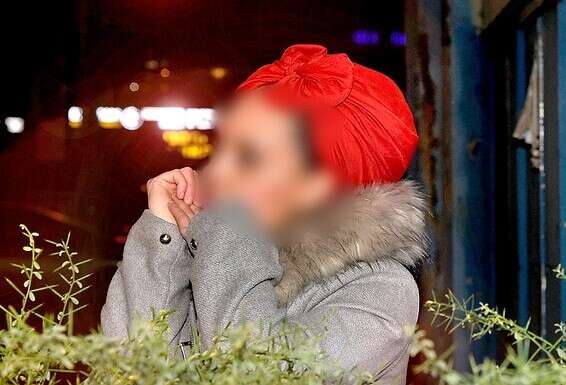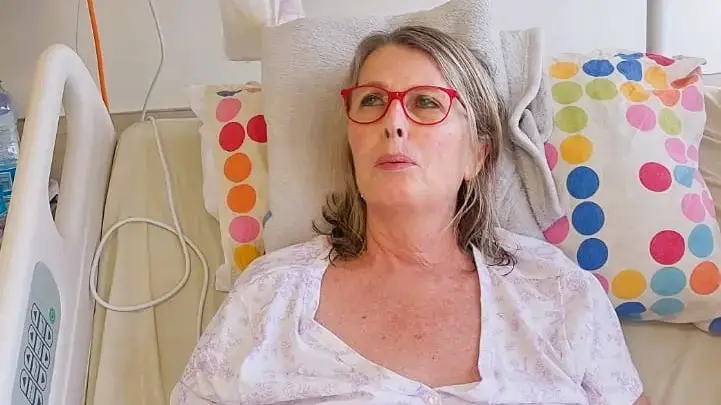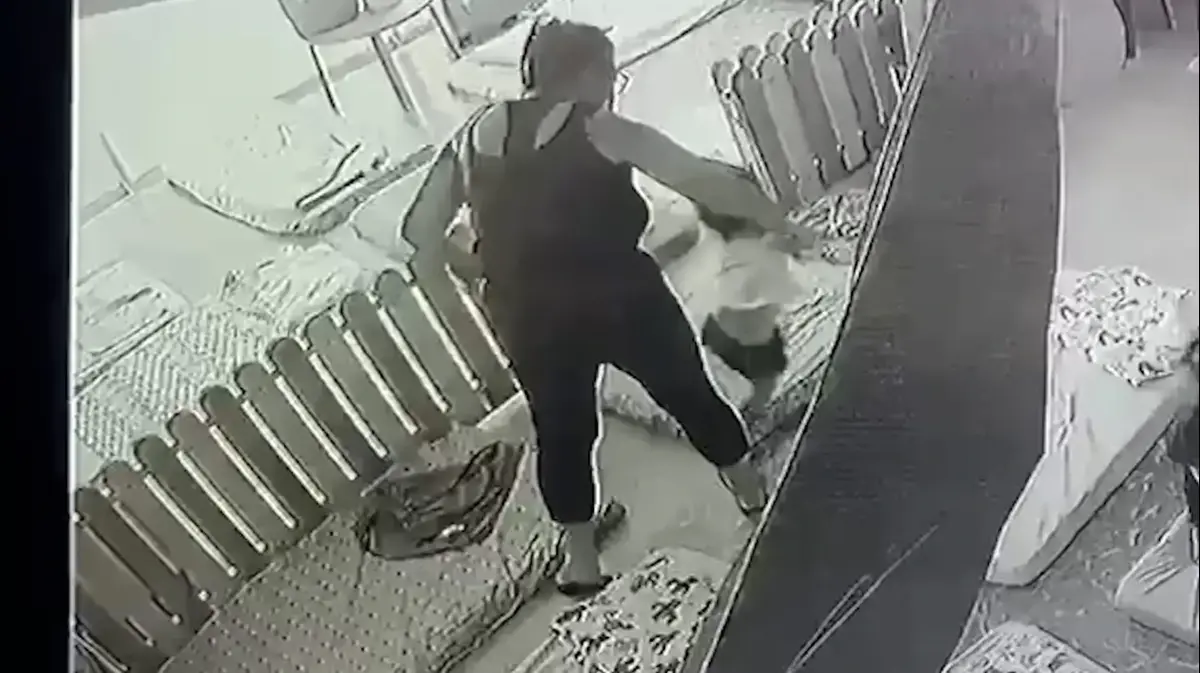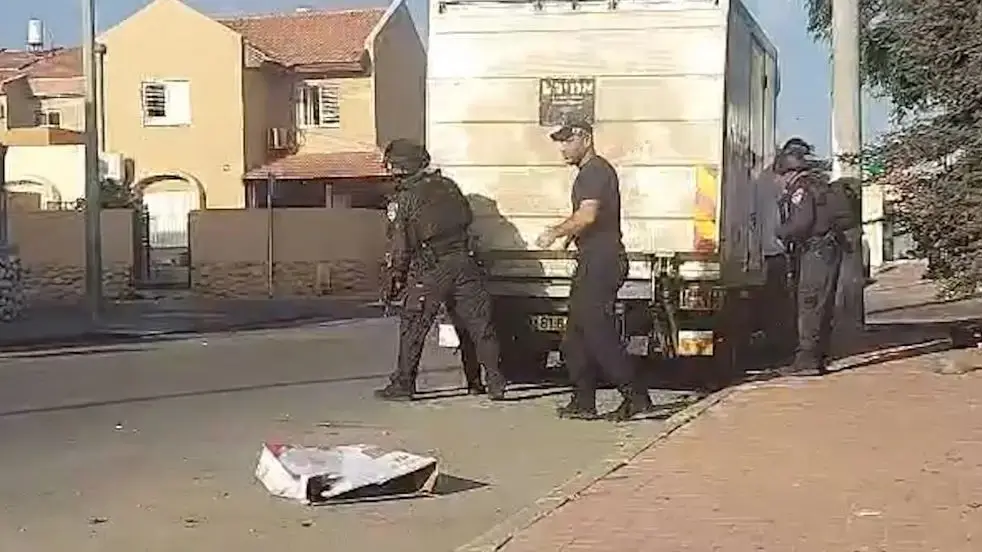After the arrest of Rabbi Aharon Ramati, the director of the seminary suspected of holding women in slavery - tells two of the women who left what they went through • Sharon: "I couldn't do anything on my own. I had to ask when to shower, what to eat" • Poetry: "Girls wound themselves With a knife to atone for sins "
Aharon Ramati, the suspect of women's exploitation // Photo: Oren Ben Hakun
In the last period, Sharon (pseudonym) manages to breathe again. Like any 23-year-old, she is the one who decides what to wear in the morning, how to straighten her long hair, where to eat and who to talk to. Until a year and a half ago, her life depended on one person - Aaron Ramati, who was arrested this week on suspicion of allegedly operating a sect under the guise of a girls' school in the Bukharan neighborhood of Jerusalem.
In her story, Sharon provides a glimpse into the complex lives of 50 women who stayed in the Midrash, and how independence and freedom were taken from them to decide for themselves how to manage their lives.
"I wasn't religious. I wore pants, I had my own phone, and other lives," she says. "They told me I needed to make a change, then lit a big bonfire and burned all my clothes. They brought me a skirt, because it's more modest, and they told me I had to ask for permission for everything I would do - shopping, wanting to vent a little outside. Not found or busy, sit and wait, he doesn't care
Don't listen to him, he won't talk to you for a few days, which is terrible, because without his permission, nothing can be done. "
Similar descriptions also provide poetry, which escaped the seminary a few years ago. This week, the day before the arrest, she received a surprising phone call from a mother who has been fighting for a long time to get her daughter out of the scene.
"She hinted to me that there was going to be a mess, and the gospel shook me," Shira says. "I've been a little quiet lately, there have been times when I didn't even think about the seminary, but since the conversation, I don't sleep again at night. I remember the flashes that paralyze me from the days of submission, brainwashing, forced distancing from parents. I still have a fear of what might have happened to me. My eyes were opened after six months, and I would not have escaped by trickery. To this day, I wonder how I have deteriorated. "
Since leaving the seminary, Shira has tried not to look back. Only once, about three years ago, did she allow herself to pass by the building with her husband. They both walked on foot in the Jerusalem Bukharan neighborhood, looked at the old building, and Shira's body shrank, as if trying to hide behind her partner's shoulders.
"I had to get my phone, and not leave without asking him." Shira Buchnik // Photo: Efrat Eshel
"I saw someone there who was with me and stayed, I don't know if by choice or she couldn't get out," she says quietly, her thin fingers tightly intertwined. "I will not forget how one day the rabbi looked at me with a piercing look, one that makes you look down, and said a sentence that implies that whoever tries to get out of there will lose the world and end up in hell. When you are there, you believe him. He is the bright and innocent, and you learn to obey his instructions." .
Two and a half years ago, she dared to deal with the anxieties and went to study coaching. "Only then did I learn to accept myself and recognize my abilities. I am still learning new things about my soul," she says. Sharon also managed to collect herself, and now works in the field of events. Her older sister remains in the Midrash, "and she has been angry with me and ignored me demonstratively since my retirement from the Midrash."
Arrested as early as 2015
Ramati was arrested this week by detectives in Jerusalem for six women, who were courageous and filed a complaint against him, accompanied by members of the Center for Victims of Cults. Severe suspicions: Possession and possession of slavery conditions, and suspected sexual exploitation and abuse of minors.
Ramati's name first came to light in 2011, though the seminary was active even before. In the same year, huge announcements were circulated throughout Jerusalem with the signature of ultra-Orthodox leaders, Rabbi Ovadia Yosef and Rabbi Shalom Elyashiv. They warned that Rami was using improper educational practices that cut off students from their families' midrash, live with them in the same home, and exhort them seemingly not to marry. "All these acts are not according to Torah opinion," the rabbis noted.
Four years later, Rami first stopped. Pupils attending a seminar near his home said they noticed the old girls on the roof, even in cold and rainy days. Six women from the midrash were taken for questioning, but Ramati was released as the women refused to complain and the police found it difficult to gather evidence.
Chief of the Fraud and Economic Crimes Division of the Supreme Court, Major General Isaac Simon Simone, was involved in the 2015 investigation, and he is also the one leading the current investigation. "We went out of our way to talk to the girls, but it was difficult," he says. "Religious adherence and belief in the leader were very dominant. Such conduct is characterized by cases dealing with sects.
"Occasionally, we re-examined the case and caught up with welfare officials. It sat on our heads. That case ended with an indictment against a nonprofit director who took money from the Ministry of Education and indirectly funded the seminary. This case is still pending in court."
About two months ago, the investigation was resumed following a complaint filed with the Cults Victims Center, which is run by Rachel Lichtenstein. The women who escaped from the seminary claimed that I was inspired by Rami to cut off their families, to become totally dependent on them and to adopt an ascetic lifestyle, along with about 50 other women who lived there.
They said they believed they had come to a warm home, but later everything turned upside down: I decimated their lives in absolute control, and they had to be approved for everything they did, including the simplest actions, such as eating. They claimed that he was the one who decided where they would work, and took his salary into his pocket. In addition, there was evidence of violence against some of the women, who were in a serious state of mind, and some were obliged to shower in cold showers.
Along with Ramati, eight women were arrested, suspected of helping him control women. Against one of them, it was alleged that the entrance was sharply rubbed into one of the girls to punish her. Ramathi's detention was extended by a week, and the arrest of seven of the women was extended for periods of two days to three. Another woman was released.
As the police officers raided the two Ramati houses, located on David's streets, and gave a boon in Jerusalem, they discovered difficult plays. The crowded place was large; bunk beds, two and a half feet high, became three-story beds, with pillows and mattresses piled high The air was compressed and suffocated, as the rooms were not ventilated, an improvised wooden structure was built in the living room, a few meters below the ceiling, and mattresses were used for sleeping.
"I worked clean. I didn't like it, I had a hard time, but those were the rules." Sharon
"We arrived in the morning and found the girls there," says Rabbi Simone. The rabbi got up from his bed and was on his way to prayer. He was not surprised to see us, apparently, that the girls who retired will come to the police. During the interrogation he took no responsibility for the acts To his home. "
What is he trying to achieve through the seeming control over women?
"He is probably looking for recognition as a community leader."
Was there sexual exploitation of the women?
"The investigation revealed that sexual messages were allegedly being transmitted to some women. We are currently investigating whether sexual relations have occurred, although they are not rape. Despite the serious suspicions, most of the women in the midrash are angry with us and expressed dissatisfaction that we have invaded their lives. And those who support Ramti are in distress and in need of help and support. "
Rachel Lichtenstein, director of the Israeli Center for Victims of Cults, says the place has been known to the center since 2010. "That same year, testimonies from parents whose daughters were in the seminary began to emerge, and we realized that this was a problematic place, with characteristics of a cult - such as family and society disconnection, and claims That the truth is only there, and everything else is wrong.
"In addition, there were radical changes in girls' daily lives, such as changing jobs, schooling and clothing. A girl who taught in an ultra-Orthodox seminary was required to leave school and spend only a day in Ramati's midrash. As more evidence accumulated, we realized that it was an abusive cult for everything. When some girls left the school, they contacted us, and we called the police.
"It is important to say: Usually, an approach is accompanied by a response to mental or emotional distress, thus creating trust between the leader and his followers. Over time, the response becomes dependent, which is also based on intimidation and threats, which makes it difficult for a believer to even dare to think of leaving. Build long time for the courage area and contact us.
"I have no doubt that the girls who stayed in the Midrash, the place they believed to be the best thing in their lives, are currently in a not-so-easy, confused, angry state of affairs, and maybe even hope this is a short episode to pass, and I cheat on them. I hope they return to their loving and caring families."
"Not good to get married"
When Ramati was arrested, the police asked Sharon to come and testify about her stay in Midrash. With trembling legs and a heart pounding, she stabilized on the Jerusalem square and revealed what she had been through for three years.
"My sister was there before me, I attended high school then and I was going to visit her. At first I came for an hour or two, to hear a lesson and to come home. Then I started sleeping there occasionally. At 19, I moved in. There were studies that you must enter, otherwise you don't have to. What to look for there.
"You can't just be in the apartment, rest, read. If there is sacred study in the living room, then all in the living room, unless you have special permission not to come. Explain constantly that spirituality is the most important thing, it is the rabbi who will be responsible for our spirituality. He kept saying that no maturity is needed to enter heaven, so there is no reason to continue studying. Today I know it's not healthy, but then I drifted after his stuff.
"My parents were against the seminar. It hurt them to see their daughter not progressing, not doing what she learned or getting married - because in the Midrash they said it was not good to get married. But they realized there was nothing to do, because I was no longer a minor. If you are over the age of 18, you will be your master, and do not need parental permission to study or live with him. For him, first say 'I am your God', and only then do you have parental honor commandments, so he is usually placed before father and mother. Took the Torah and took things out of context. "
During her stay in the Midrash, Sharon decided that she wanted to study a profession, but at the seminar she referred to her wishes as heresy. "I was told they would not let me into heaven if I learned. But my parents thought it was important for their children to get an education, and they paid for a professional course for me. I had to ask permission from the rabbi, and allow me only on condition that I not connect there with people, "But it's only good for me in the Midrash. They wanted to see me write bad things about the people in school, so the rabbi would feel that I loved and respected him only. I did it, even though I didn't like it. I just wanted to learn."
But even after school, she was not allowed to practice in the field she studied. "The girls worked mostly in dorms and toddlers, cleaning or caring for the elderly. I worked in cleaning. I didn't like it, I had a hard time, but those were the rules.
"Adhering to modesty was also difficult. In the dorm, when collecting the children, the girls had to hide and read psalms so that they would not accidentally meet the children's fathers. The rabbi was allowed to talk, but with another man not. Even if you were going to buy something outside, You were not allowed into a kiosk or shop if the seller was a man.
Two of the women arrested with Ramti on suspicion of helping him control women // Photo: Oren Ben Hakon
"At first, it didn't seem strange to me. I understood that because you are brainwashed, it sounds legitimate not to talk to other men. Until you start thinking a little for yourself and realize that even in ultra-Orthodox neighborhoods, there are ultra-Orthodox sellers in stores, and women buy.
"On Saturdays, for example, there was duty. One was responsible for cutting salad, one for making the cake, one for the chicken. The rabbi dined with his family at his home, and then went to the synagogue set up in the Midrash. He is a shrine, worshiper and minister. If you are hungry and want to eat already, you must wait for the prayers to end.
"We would sit on cramped benches in front of a long table that had lots of food, but little of anything. If someone was punished and was told she had no right to make the food she was responsible for - then that food would not be on the table. Prepare instead. The punishment was collective. "
Her voice breaks, and she stops talking for a moment. After a long minute, she goes on and on about the rules in the midrash. "The girls would tell me to take a box of matches, put my hand over the fire, and see if I could survive, 'Because that's how it was in hell." They brought me a box of matches, and said that whenever I wanted to do something different from the rules of the house, I'd already light the fire myself. One of the girls lit a match next to my hand so I could feel it, and I told them to throw it away. I internalized that I couldn't do something forbidden. "
The exterior look, she says, also depended on Ramti's wishes. "I couldn't wear what I like, because I decided on which skirt I would wear, what shirt to wear, and even how to straighten my hair. There were girls who decided on everyone's attire after asking the rabbi if it was modest enough. For him, the hair collection also indicated a level "He didn't even allow me to change a braid hairstyle for ponytail. If we went on a trip, he was the one to decide what to take in the bags."
The rabbis warned: "All his actions are not according to Torah opinion." Rabbi Ramati is being released for detention, this week // Photo: Oren Ben Hakun
The seminary was initially conducted in an apartment on 24 King Saul Street in Jerusalem, where Shira Buchnik was also staying. Shortly after Sharon joined, the girls moved to the street to be greeted. Sharon became a housemate in Ramati's apartment.
"He invited me to sleep with him and his family, and made it clear that when I was there, I had to bring him my phone, and that I would not leave without asking him. I was sure he was taking the phone for a day or two, I did not think he would get it completely and cut me off from all my friends "For almost a year, I was there like a housewife, unable to do anything on my own. I had to ask when to shower, what to eat, when to talk to my parents, if ever given permission."
And you agreed?
"I agreed, because I was afraid something would happen to me. He was a kind of fatherly, authoritative figure who should be worried about you. But at the same time he would scare you. He also put me in his house, so it made me want to do more things for him, like cook and bring him food, Because how can I come to him empty-handed.
"You get brainwashed, you get carried away thinking the mood in the house is fine. If you live with the girls, these are the rules, and everyone does it. At first I didn't understand what was going on with me. I didn't realize it was wrong for me to decide what to wear, what to learn, What to do".
After about a year at the Ramati family, she was informed that she could go back to sleep with the other girls. At that moment, she realized she wanted to go, and not come back. "Every time I was able to leave the house for a short time, with all kinds of excuses. I said I had to bring something from below, that I forgot something at work.
"One day I just took a small bag and went out. I left everything I had there, which is some clothes and personal equipment, and went home to my parents. My sister and a few girls sent me messages that I would return. I was unclean. I didn't realize I didn't want to be there. "To this day, if my sister sees me by chance, she doesn't look at me. In her eyes I am unclean."
Have you met since you left?
"Yes, she came to visit the parents. I tried to talk to her, I asked her why she was fleeing from me, but she didn't answer. I felt sorry for her. I knew she couldn't answer, because she had to ask the rabbi what to answer, or if she was even allowed to answer. I let her go, poor man. She is so brainwashed because of him that it's scary. "
Despite the disconnect, Sharon is worried about her sister. "I want this place to close," she says emphatically. "The rabbi has to stand trial, and the girls will live their lives. They will marry and flourish. There are poor girls with tremendous abilities who have gone into depression. The rabbi has convinced them that they cannot marry on their own, but that he should find a son-in-law. Because education is complicated, it's a completely illogical argument.
"I'm sorry. I hope maybe now the girls take advantage of their abilities."
"I identified a weakness"
Poetry Buchnik (29) has green, gently green eyes. A red handkerchief covers her head and ties in the front carefully. She is slim and petite, dressed in a fashionable black skirt and high heels, but holds a good old Nokia device with no internet. From her little red bag she pulls out the letters she wrote to the complainant and the first chapters of her future book.
Shira was born in a small town in northern France to an ultra-Orthodox family. When she was 3, she immigrated to Israel with her parents, her two older brothers and her younger brother. Her father works as a writer, and her mother is a caretaker. They settled in an ultra-Orthodox neighborhood in the south, where three other children were born.
"I had a happy childhood, my parents didn't miss anything. We lived in a big apartment, had a family car, and had no financial difficulties or extreme arguments. In elementary and high school, I was considered a good and accepted student, but I never initiated or stood out. I preferred to be silent.
"Although everything was fine, I felt that something was missing, and I couldn't put my finger on it. Like some kind of hole in my soul that manages to manage me. I managed to hide my feelings. And after high school, I signed up for a seminar. I didn't see myself getting married quickly, the curriculum was important to me.
"By the middle of the first year of the seminar, at 19, everything changed. A high school senior, who was studying in Jerusalem, invited me to come and visit some of her friends, who attend a girls' college in the Bukharan neighborhood. She said she knew them when they arrived at a boarding school where she slept and invited girls to singing poetry.
"We went there, my girlfriend came in, and I waited for her on the street. Suddenly I heard laughter and saw a group of ten girls come to me quickly. I looked at them and felt like a criminal, because I was wearing a skirt that covered only my knees, and they were in dark skirts that reached the floor, shirts. Buttons up to the top, and a long set and hair wrapped around the braid, they surrounded me, smiled and asked me to come in. In retrospect, they examined me, wanted to see if I fit the submissive pattern.
"We went into a room that had four bunk beds and mattresses on the floor, and all the girls were on me. I couldn't stop saying what a privilege it was for me to reach them, and I would have an even greater right if I could hear the rabbi and ask him questions. They didn't stop praising him, telling how much he was Smart and human.
"I was passionate, and confused. Apparently, they recognized weakness and dependence, and maybe insecurity. I got a sense of belonging. In retrospect, they just hunted me like a wounded animal.
"I listened to them thirstily until I realized it was late. I naively said I should move, because my mother would be angry, and they said my mother could not decide for me, and that I should fight for spirituality. One moment I laughed with them, another moment I cried. Emotions. I felt magnetized to them. The feeling was that it was a place of happiness. "
During the night, the young women invited Shira and her friend to a Torah lesson that Ramati passed. "I listened to him, he seemed such a paternal, with piercing eyes. I felt that the things he was saying were aimed at me and my girlfriend.
"After he finished, one of the girls told me to ask what I needed. I said that sometimes I want to do things, and my mom objected, and I asked if I had to honor her wishes.
"The rabbi's answer surprised me. He said that even if the parents objected, it did not mean that I had to fulfill their wishes.
"After the class, I talked to him. He told me that if I wanted to come to the Midrash - I would do it, and I would not address my parents 'objections. He gave a parable to a student who did not come to his deceased parents' home because his rabbi argued that teaching Torah was more important. Go home, and he'd better stay with him.
"I called my mother and announced that I was not coming back. I lied that I was in boarding school. It was like the first spark of rebellion. I stayed in the Midrash, and I felt the light touched me. During the night, we did not sleep, all girls, and only talked about spirituality."
Rachel Lichtenstein, CEO of the Israeli Center for Victims of Cults
"Something in me sealed"
In the early morning, Shira left the seminary on her way to her home in the south, but her heart remained with the girls from Jerusalem.
"In the next few days at home, I did not feel connected. I called G, one of the girls from the Midrash, who asked me to call her on any problem, and later it became clear that she was a senior there. I came to Jerusalem several times a week, heard the rabbi's Torah lessons, and occasionally stayed to sleep. Some of them but still not fixed.I knew it was only a matter of time before I lived there.
"As Seder approached, I lied to my parents that I was going to celebrate the company's boarding school. The girls convinced me, and like a spider, the twos around me were happening. Mother resisted, but I didn't give up. I also convinced my sister, who was 17, to come with me. .
"When we got to the hall where they held the order, the girls of Ramati cheated on me and my sister. They did not stop praising him and the place, explaining how false everything was. We were left to sleep in the school, and they cleared us two beds.
"Two days later, on the way back home on the bus, I noticed that my sister was apathetic and seemed depressed. At home, she shut herself up and didn't speak. I suggested to Mother to take her there again, to be strengthened and encouraged. We went for a weekend in the Midrash. The rabbi funded us a special taxi to Jerusalem. His, and suggested we stay there.
"It seems a little strange to me that every young woman out there sends to Rabbi Sams to ask if she can come in for a shower, but I didn't focus on it.
"After the Passover holiday, my sister went back to boarding school and broke away from the Midrash. I went back to the seminary where I studied, confused. All I wanted to do was go back to the Midrash. I talked to the girls there and the rabbi, and I knew that my ambition was to live there permanently. To one of the well-known rabbis in Bnei Brak, he told me to tell him that the house is unstable and that my parents are in conflict. "
Doesn't that sound unusual to you?
"I was blind and mesmerized. It's hard to understand the aftermath if you don't talk to him and experience the atmosphere in the midrash. These brainwashes make a difference in the end.
"My brother-in-law almost took me to a writer and educator in the ultra-Orthodox sector, who called Rabbi Rami a 'false messiah.' But I was just annoyed and barricaded myself in my position.
"I asked Dad to take me to Rabbi in Bnei Brak. I lied to Rabbi, and he recommended that I leave the house. I was sealed.
"When we got home, I made it clear to parents as I do not listen to them. I packed a suitcase and left the house. Mom standing in the doorway and cried bitterly. I looked at her, and everything was cold inside. I did not have a drop of sympathy. I believed I was going to a place that is all good.
" When I got the FGS Jerusalem, Rabbi I cheated and the girls welcomed me. They said I came from exile to redemption, and that now I would only be good. The rabbi said I overcame the evil and the devil. That's how he treated my parents. "
The Midrasha in Jerusalem // Photo: Oren Ben Hakon
"Thugs tried to kidnap me"
Shira was housed in the apartment next to the rabbi's house, in a room with four bunk beds, and received her own wardrobe. The first two weeks, she says, were euphoric.
"My mother never stopped calling and begging me to come back, as did my friends from the seminary. The seminary convinced me that my mother and friends were harassing me, and one of the senior officials confiscated my phone."
What does your Midrash agenda look like?
"All day I was in the house, and I didn't go outside, because I was told that it was dangerous outside, that could hurt me, and only there I was protected. I prayed and studied with the girls books of morals. Three senior members of the group did not move from me, that I will not have heretical thoughts. I felt connected to A. and got to know D., who lived with her parents right next to the seminary and stayed in the seminary all day.
"At first, they didn't ask me for anything, I just washed my clothes. I didn't clean or cook. I don't see how I don't think the girls slept like this on the floor around, and some of them were many who were more close to the rabbi. Just like a wolf band."
Three weeks after she arrived, an incident occurred that marked her poetry as problematic. "Two thugs came to the house and shouted my name outside. The girls blocked them with their bodies and didn't let them in. I was alarmed.
"The men managed to fend off the girls, grabbed me by the hands and just dragged me out toward a black car with dark windows. I screamed and cursed like crazy. I realized I was being kidnapped, but I didn't know why. Maybe 30 girls came out of the house, the rabbi didn't, and they surrounded the men screaming. And screams, and they wouldn't let me take me. I was under crazy pressure. At the end of the men they surrendered and let me go. The girls enveloped me in hugs and made me feel like they were fighting for me. "
Do you have any idea who the men were?
"I never talked about it with the family, but I know that both parents and uncles asked for help from all kinds of causes, private investigators and organizations that specialize in recovering lost girls. Some of them probably decided to take action, which has left me traumatized to this day."
A few days later, Shira's mother arrived. "The girls didn't let her in. I heard her screaming that they spell me out and wanted to get me out of there. I wanted to go out, I haven't seen her for a month. But the girls refused to come near the room door. "At the end, they ordered a police van, which drove her away."
Following the mother's stabilization, the school instituted sanctions against poetry. That day, at midnight, she went with ten girls to Moshav Ahiezer near Lod, where they were staying with one of the families. "I became the one who causes trouble, that people come looking for her and endanger the tranquility, so they wanted to keep me out of the compound. I didn't care. My personality was wiped out, I walked like a dead animal. I didn't even cry about what my mother did.
"A few days later, I returned to Midrasha, and was informed that I was moving to another apartment, in Givat Shaul, which turned out to be a hiding place. I care, there was a little less crowded, three seniors, who recruited young women to the midrash, came to look after me.
"I was in the hideout for three months. Occasionally, I asked for my phone, and then the girls surrounded me, asked me to speak on the loudspeaker and told me what to say, especially if it was my mother. With her, I said I was calling my aunt, who didn't seem too dangerous to them, and after the call, I deleted my mom's number and dialed my aunt's number so they didn't know it was the beginning of the crisis facing the place.
"I looked at the girls around, and in their eyes I saw suffering. They dictated to us when to shower, who to talk to, when to leave. And the money went into the account of one of the executives. I was not a sucker, and I asked for the salary every month. She gave me around NIS 1,000, and I have no idea if that was all or some of her money. My personality was wiped out, only the rabbi existed.
"In the hiding place, a horrifying phenomenon was revealed to me. Girls wounded themselves with a knife to make atonement for sins, and perhaps to feel pain in the opacity. I went into depression. I used to come back from work and go to bed.
"I didn't talk to anyone, and I missed my parents. It was clear that my departure from there was approaching. Occasionally the rabbi came to the apartment and always talked about the evil inclination, and how important it was for us to stay with him. He called people who opposed him by the names 'evil spirit' and 'devil'." .
The girls' obsession with the rabbi began to dwell on poetry. "One night before midnight, the executives came into the room and said they were taking me to take a shower somewhere else. We walked for fifteen minutes on the street, not realizing why they were constantly looking. I went into the mikvah, where I felt choked up. .
"It was a wake-up call for me, but I was silent and went into the shower. I was told that there were other bachelor girls in the Midrash who came to dip there. I went back to the apartment and said nothing to anyone.
"In the morning I asked for the phone to call as if my aunt. I called Dad and told him briefly that he would come to pick me up now. I closed the call, took a bag of couscous and sprinkled in my wardrobe. In a suitcase.
"When the girls asked me to come with them for a Torah lesson in the Midrash, I said I had to keep cleaning, but they had to leave the phone on so I would let them know when I was coming.
"For some reason everyone believed me. I found myself alone. I begged Dad to come quickly. He arrived at noon, just when the girls were back from class. They were so surprised they didn't stop me. I ran with his suitcase to his car, and we ran away. Unconsciously. When we got home, Mother cried happily. "
When she talks about the moments of escape, her eyes are frozen and her voice is monotonous. Looks like she's talking about another person.
How about getting back to sleep in your bed, without dozens of girls around?
"Fun. I didn't miss it at all. I only had questions about religion, how does such a thing happen and God doesn't see it? Questions without answers. I talked to friends from the past, and they gave me the power to keep the faith."
Did you go to psychological treatments?
"No. I had a suspicion that I was in a sect and couldn't fall asleep at night, but I just wanted to go back to normal and leave this affair behind."
Major General Isaac Simon
"Have mercy on them"
A few days after returning to her home, singing for a seminar was recorded in Bnei Brak. Six months later, sponsors came to the seminar. Shira and her parents explored them all and chose Hanoch Buchnik (29), Avrach and a musician, known in the ultra-Orthodox sector by the stage name Hanoch Ben Moshe. Over the next few months, he plans to release an album.
"I knew it was already on the first date," smiles Shira for the first time in our conversation. "After two months we got married. Two days after the wedding, I told him about the seminary, and at first he dismissed it and did not understand the meaning. When the rabbi's arrest was published in 2015, he realized that the issue was serious and I survived the inferno. fresh.
"Seeing the rabbi's face today looking at me from the newspaper made me sick. The evidence did not surprise me, it is no different from my period, except that there were no children then. Maybe because I was in a hideout apartment, I did not see them."
What do you feel about the women who lived in the Midrash and were angry at Ramati's arrest?
"I feel sorry for them. In their situation, they are difficult to think independently. They are poor and miserable. The rabbi has taken control of their thinking, and they are not aware of the real reality. They are in denial. If I did not complete the process, then they too will probably take time.
"When I started coaching, I fell in love with the field. My husband was startled at first, and I had to reassure him that not all schooling is a cult. "Even as a mother, I understand my mother's feelings and anxieties at that time. What a suffering it was for the parents."
Are you mad at Rami?
"After learning that he was arrested, I cursed him and wished him all the diseases in the world. I wanted to cut him to pieces. Then it calmed down. My feelings are mainly for girls who complained, he doesn't care about me. The police and the prosecutor's office will take care of him."
This week Shira sent an exciting letter to the girls who complained to the police against Ramti. And so she wrote to them:
"No joy and happiness from me, when I was told that you had been adopted for the huge step you made. I waited for this day, and here you are real heroines. Now everyone has freedom of speech and ability to think for themselves, to realize that the Midrash where they were was a cult for everything. Destroy and destroy every good part, for a person with personal and lustful interests. You will find a special personality hidden in each one, and sure you will discover how much you deserve to live in your own right, and not under the control of someone who dictates life. "
***
Attorney Gabi Trunshoili, who represents Aaron Ramati on behalf of the public defense, said: "We are in the early stages of the procedure. The rabbi argues that this is a conflict between women who are in the seminary and their family members, following which complaints have been filed. The complaints have been investigated in the past, and nothing has been found. The rabbi cooperates with the researchers and denies all suspicions. "
tala@israelhayom.co.il
batchene@israelhayom.co.il









